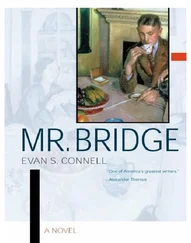“You’re frequently mad,” Carolyn responded.
“Nobodyll find out/’ Duchesne answered.
“You’re an ogre/’ said Carolyn.
Duchesne didn’t think that was a good reason.
“Then, because/’ said Carolyn.
“Why, because?” inquired Duchesne.
“Because, that’s why.”
“Because why?”
After this had gone on for several minutes Carolyn said her mother wouldn’t approve. Duchesne apparently was thinking this over because his chewing gum snapped inces-santly; then he muttered something Mrs. Bridge could not hear.
“But of course not!” Carolyn sounded shocked. “Are you mad?”
“Aw, why not?” Duchesne bleated. “Don’t be a duchess.”
In a very superior tone, then, Carolyn said distinctly, “Because, that’s all. We won’t discuss it any further. And besides, don’t be excruciating/
Duchesne, sounding uncommonly like a musical saw, was heard to say, “Awwwww, awwwww, jeez!”
“I feel terribly sorry for you,” Carolyn said with unnatural compassion. ‘Td like to, you know. Really, really 1 would, don’t you know? So terribly, terribly much, you mad child. Because you’re good/* she said earnestly, “Good!” And Mrs. Bridge, puzzled, tried to recall that particular Inflection because it did sound familiar. She wondered If Carolyn was running her fingers through Duchesne’s hair, or, considering how short It was, over the top. He was working on the chewing gum again. Mrs. Bridge sensed that Carolyn had him on the defensive.
“I am fond of you, Jay. Dreadfully so. I ache, actually. But but “
“Listen, Cork/’ growled Duchesne, man of action, and his big feet scraped on the doorsill. “You want to be a virgin forever?”
“Silly!” said Carolyn.
Mrs. Bridge, clutching the banister In horror, was gathering strength to speak out when the door bumped shut and Carolyn sighed, clearly alone. A moment later the engine roared and the tires squealed out of the driveway. Carolyn went Into the kitchen. Mrs. Bridge, folding her robe more tightly, stood In the upper hall trying to regain her composure. If anyone had asked her such a question she was positive she would have slapped the boy with all her strength, but a moment afterward she thought of the night some twenty years ago when she had barely resisted the pleas of a boy whose very name she had long since forgotten. It was the moonlight that had weakened her, the moonlight and her own desire.
“Carolyn?” she called very softly through the silent house.
The refrigerator door closed. Carolyn walked into the downstairs hall and gazed upward.
“Are you all right, dear?”
“Natch/’
“Did you have a good time?**
“So-so.”
“That’s nice,” Mrs. Bridge said absently, drew the robe more tightly around herself, and started back to bed.
“Mother?”
“Yes, dear?”
“We’re all out of peaunt butter.”
“Oh, thank God!” whispered Mrs. Bridge. Aloud, softly so as not to waken her husband, she called, “I’ll tell Harriet to order some in the morning. Don’t stay up too late/’
When Harriet, who was at times inclined to insubordination, brought in the breakfast tray Mrs. Bridge exclaimed, “For Heaven’s sake! What on earth happened to you?”
“Couperin,” said Harriet, grinning.
“Oh, goodness! Is he the one with the motorcycle?’
“No, ma’am,” said Harriet vehemently. “I took my last ride on a motorcycle, believe me. Approximately eight or ten weeks back.” She began to feel tenderly about her jaw, on which there was a large purple bruise.
“I certainly hope this was an accident,” said Mrs. Bridge.
“It came about,” Harriet replied with regal poise, “because only last evening it so happened that I and that Couperin had a grave dispute. Couperin, he got the worst.”
The evidence seemed to indicate Couperin had spoken the final word, but Mrs. Bridge decided not to get involved.
“What does he do?” she inquired, to change the subject.
“He is associated with the collection bureau of this city.”
“Tax collectors, or “
“Bureau of rubbish and trash. Then, too, he plumbs a bit. When he is Inclined.”
Mrs. Bridge, beginning to sense this would be one of Harriet’s Insolent days, sipped at the orange juice and then started to butter a slice of toast.
“Last evening,” Harriet continued, wetting a finger and touching up her eyebrows, “I received his proposition/’
This obviously demanded some sort of acknowledgment, even though Couperin or one of the other suitors proposed every Thursday night. “What jarred Mrs. Bridge as much as anything was Harriet’s referring to It as a proposition Instead of a proposal, and every Friday when the subject was mentioned she was about to point out the difference.
“I hope you didn’t accept/ she said, pouring some cream in the coffee.
“Frankly, I was tempted/* said Harriet. “However I declined, as you say. The reason being he chooses to get disgustingly drunk following on the heels of his pay check. I disapprove of that, don’t you?”
“I most certainly do/* agreed Mrs. Bridge, busying herself at the table somewhat more than necessary. Then, as Harriet appeared to be reflecting on the previous evening, she said, “Isn’t that a new hair-do?”
“Well, It Is, yes/’ Harriet pushed It lightly with her fingertips, “I believe It will prove suitable/*
“You look very chic/*
“Well, I find it pays to keep up appearances/*
Mrs. Bridge had the feeling she was about to pull out a cigarette. “Perhaps you’d better look In the refrigerator and see If we’re going to have enough whipping cream for the week end/*
Harriet, holding her braised jaw, turned to go Into the kitchen.
Mrs. Bridge, who was very thankful that Carolyn had no Couperin to contend with, said, 4 1 hope you won’t be seeing him any more/”
“I believe not until next week on the customary evening,” replied Harriet.
60. Laundress in the Rear
Every Wednesday the laundress arrived, and as the bus line was quite a few blocks distant from the Bridge home someone would usually meet her bus in the morning. For years the laundress had been a withered old colored woman named Beulah Mae, who wore a red bandanna, a ragged velvet dress split at the seams, and a pair of tennis shoes with the toes cut out because her feet hurt. Mrs. Bridge was very fond of Beulah Mae, speaking of her as “a nice old soul” and frequently giving her extra money or an evening dress that had begun to look dated, or perhaps the cookies that she was obliged to buy from the Girl Scouts. But there came a day when Beulah Mae had had enough of laundering, extra gifts or no, and without a word to any of her clients she boarded a bus for California to live out her time on the seashore. Mrs. Bridge was therefore without a laundress for an Interval of several weeks, during which the work was taken to an establishment, but at last she got someone else, an extremely large, doleful Swedish woman named Ingrid, who said while being interviewed in the kitchen that for eighteen years she had been a masseuse on the island of Got-land and wished she had stayed there.
When Mrs, Bridge arrived at the bus line the first morning Ingrid saluted her mournfully and got laboriously into the front seat. This was not the custom, but such a thing was difficult to explain because Mrs. Bridge did not like to hurt anyone’s feelings, so she said nothing about it and hoped that by next week some other laundress in the neighborhood would have told Ingrid.
But the next week she again climbed in front, and again Mrs. Bridge pretended everything was satisfactory. However, on the third morning while they were riding up Ward Parkway toward the house Mrs. Bridge said, “I was so attached to Beulah Mae. She used to have the biggest old time riding in the back seat.”
Читать дальше












